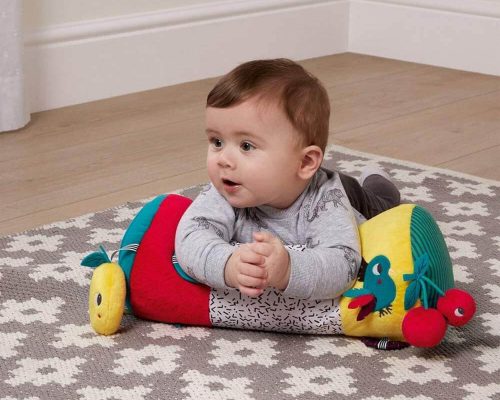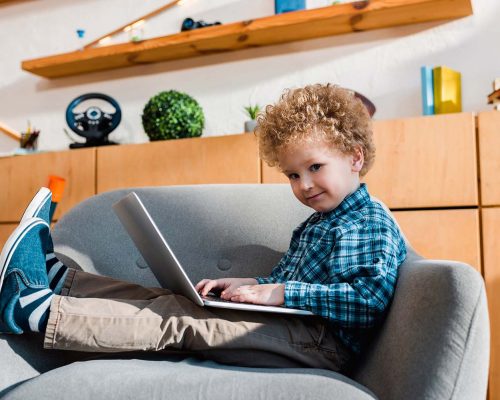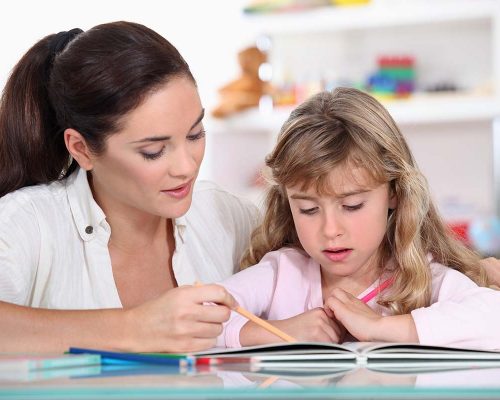5 Early development activities for 0-6 month babies
Most mums will tell you they just want a healthy and happy baby. Of course, this is completely true. But secretly, we also hope our little bundle of joy grows up to be as smart as a whip too. Many of us go as far to play Mozart to our belly during pregnancy and decorate the nursery with stimulating shapes and colours. It is natural to want an intelligent child and to do what you can to help them grow, mentally. But there are much easier ways to make sure your baby is learning and increase your odds of raising a smart baby.
Before your baby is even born, he already has all the brain cells that he will ever need through his life. That’s around 10,000 billion, if you can even imagine that number. The first few months of your little one’s life are an amazing time for learning. Your baby likely cannot speak, walk, or even play very well during this time, though their brain cells are making new connections at a tremendous rate during the first 6 months of life.
While babies develop at their own pace, there are ways you can encourage that growth. The more stimulation your baby receives on his senses, the more connections are created among brain cells. This helps build the infant’s brain early, leading to increased chances of having a smarter child. I can’t promise you’ll have a tiny genius after trying these tips, but any small task to support your baby’s brain development is beneficial.
Despite your baby being so young you can definitely put them ahead and encourage their development. I want to share with you a few tips to that will help you raise a smart baby.
Early Development Activities
Building your baby’s brain starts when you are still pregnant. Because you are part of their brain development, it is important to avoid any harmful substances while they are still wiggling around in your tummy. Once the little miracle is born, they will more easily build brain strength in situations where they feel safe and secure. Showing love and care through activities you enjoy to do with your child like talking, playing, cuddling, singing enhance their brain development.
Play with your baby in a way that will stimulate her brain and senses. Some of the best activities you could partake in with your baby to improve brain development are listed below.
Happy-time play
Dopamine is a chemical released by the brain to make us feel happy. If you want your child to be an enthusiastic learner, help them develop peak levels of dopamine in their brain. You’re probably asking how you could possibly help chemicals form in your child’s brain. It isn’t as scientific as it sounds; no worries. There are two important tips to remember when trying to stimulate dopamine formation. They include:
- Have lots of play-time at the child’s level (playing down on the floor or on the bed)
- Use energetic commentary when communicating during play.
If your child is bouncing around in their jumping gym you could say, “Wow! You’re jumping so high! That’s amazing!” If you remained silent, with no positive feedback, the baby’s dopamine would very quickly drop and they’d probably eventually give up. Children who have gained ideal dopamine levels are less likely to suffer from depression later in life.
Horseplay (sensibly)
Physical movement is important for raising a smart baby, so don’t leave out the silly roughhousing. While we used to label our peers as nerds or jock, it was assumed you could either have the brains or the brawn. But in order to do physical play, you have to be able to think your way through it. It, in fact, takes brains! Physical play develops cognitive functioning. It helps strengthen the frontal lobes for concentration and attention. It develops new progress in the memory system of the brain.
But how do you roughhouse or horseplay safely with a baby? There are many safe options that can be used including:
- Lap or rocking games
- Songs that have claps and movements to them
- Face-to-face games like peekaboo
- Hand games like patty cake
- Flying your little one airplane-style above your head
Explore in tandem
Let’s admit it; sometimes it is easier to just sit your little one on a mat with their Montessori toys or in their bouncy chair with attachable toys. While these are great brain-building activities, it is important to get some one-on-one play as well.
Choose activities that you can play together rather than traditional toys you hand off to the baby for solo play.
Sensory, stimulating items such as a discovery box filled with feathers is a simple way to play together as they explore new things. Even filling a bucket with water and soap before eagerly popping bubbles together would help your baby develop new skills. Babies do learn best from one-on-one interaction because they can model that you do then learn to self-explore.
Daily Storytime
We have all heard that reading to your child from infancy will make them smart. But there is more than raising a reader. You will help them develop a multitude of skills, including emotional vocabulary and empathy. Reading together is a great way to bond with your child, reducing aggression and anxiety.
When reading together, try labelling the characters’ emotions. Your child will learn to see things from another person’s perspective. A good strategy is to mimic the characters as you read. If a person or animal in a picture book looks happy, mention it, and then smile at your baby. If they are sad, say so, then frown at them. They will likely laugh or be intrigued by your stimulating storytelling.
Dancing and Singing
Listening to music encourages interest in music and strengthens the bond with their parents who they are sharing the music with. This is an important part of emotional development. Try putting on one of your favorite songs. While holding your baby securely to your chest, gently move around together in a dancing motion to the music.
If your little one is throwing a tantrum or resisting a nap, sing them a lullaby in a soothing voice. Even if you don’t know the words to a lullaby, sing your favorite rock song in a slow soothing tone. They won’t know it was the Ramones who sang that soothing tune until they are much older.
Avoid Screens
Intelligence at this age is indeed sensory and motor rather than conceptual or pictorial.
The development of a young child goes through motor skills and the ability to interact with the objects he encounters. Observing, touching objects, playing are essential for the good development of your little one.
Before 3 years old, babies are fascinated by screen, the images, shapes, sounds… Unfortunately it’s impossible for them to understand what is happening in front of them, making this time in front of the screen useless for your child development. If anything it deprived toddlers of this exploration of the world in 3D fundamental for its development at this age.
It’s not always easy to resist the temptation to busy your little one with a TV or an iPad, but many parents managed to redirect their attention to real life activities. Helen, mum of the little Charlie, shares her experience and best tips on the matter in her blog.
Summing it up
One final expert tip for you before you go: take a break from all these stimulating games and toys once in a while. Sometimes sitting quietly with a few toys in a playpen is good rest for the brain. Not to mention it gives mum some time to relax a bit. Try adding a few of these activities to your infant’s day. Keep the most stimulating play during the day and the soothing activities at night. Sleep is still the most important thing for that sweet baby’s brain.



